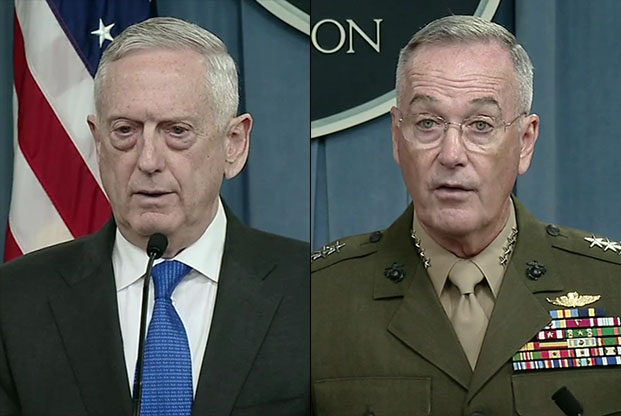
Defense Secretary Jim Mattis and Marine Gen. Joe Dunford, Chairman of the Joint Chiefs of Staff, speak at a joint Pentagon press conference on Aug. 28, 2018. DVIDS screenshots.
The US military has been engaged in almost 17 years of combat in Afghanistan, and is about to install another commander of US and NATO forces, though the plan is not to keep an “enduring large military commitment,” top military leaders said Tuesday.
The Pentagon is just over one year into the administration’s South Asia Strategy, though the Taliban has been resurgent in recent months and US airstrikes are at a level not seen since 2010. This current presence is not expected to last in the long-term, Defense Secretary Jim Mattis told reporters Tuesday.
Defense Secretary Jim Mattis and Marine Gen. Joe Dunford, Chairman of the Joint Chiefs of Staff, speak at a joint Pentagon press conference on Aug. 28, 2018. DoD video.
“Would we still have troops in Afghanistan five years from now? I can’t give you the answer to that,” Mattis said during a briefing at the Pentagon. “If they’re able to handle their own security and the international community determines that, and the NATO-led effort is no longer needed, I could imagine it coming out. But … that’d be a no more well-founded answer to you than idle speculation from anyone.
“We think there are positive reasons to stick with the strategy. And we are going to drive this to a negotiated settlement.”
Mattis immediately rejected a reported plan by former Blackwater executive Erik Prince to privatize the US effort in Afghanistan by using contracted forces.
“When Americans put their nation’s credibility on the line, privatizing it is probably not a wise idea,” Mattis said.
Current US Forces-Afghanistan and NATO Resolute Support Mission commander US Army Gen. John Nicholson is retiring in the near future, with US Army Gen. Scott Miller set to take over command. There are now 39 nations contributing to the fight.
“It’s not a US presence alone, and it shouldn’t be implied that way,” Mattis said. “We are there in order to ensure that America’s security … is not threatened out of that location.”
There will be a permanent diplomatic presence in Afghanistan to take charge of US security interests in the country, “and we’re going to maintain a presence to have influence in that region,” Chairman of the Joint Chiefs of Staff Gen. Joseph Dunford said. However, “I certainly don’t expect that the current forces that we have in Afghanistan represents an enduring large military commitment.”

